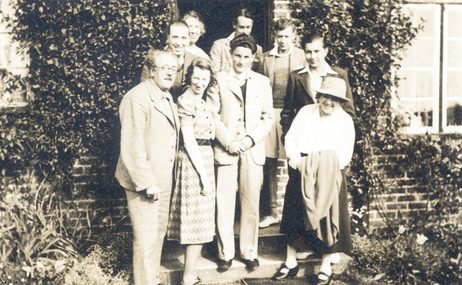Presented by Lucy Walker
Britten had begun working for the General Post Office (GPO) Film Unit in September 1935. He was employed to compose incidental music for public information films, often about some aspect of communications – such as telegrams, stamps, or (in one of the most famous films), the ‘Night Mail’. Coal Face, his second score for the GPO, is rather different in having a strong social message. Superficially it relates statistics about the coal industry, but among the narrator’s dry recitation of facts is a horrifying message: that ‘Ev’ry working day five miners are killed and over four hundred and fifty injured and maimed’.

Poetry selections by Percy Bysshe Shelley and Alexander Pope that were possibilities for the work. Written in Britten’s own hand. Courtesy of the Britten-Pears Foundation
Philip Reed has suggested that the film and its score make deliberate use of the juxtaposition of man with machine. The ‘machine’ is illustrated ingeniously in an extended sequence for percussion: Foley-style, a vast array of instruments imitates the sounds of machinery. Alongside, the humanity of the miners themselves is expressed in Britten’s setting for female voices of Auden’s poem ‘O lurcher-loving collier’, as the miners are seen ascending up to ground level where they’ll meet their wives and families. (See: Philip Reed, ‘Britten in the Cinema: Coal Face’ in The Cambridge Companion to Benjamin Britten, edited by Mervyn Cooke).

Footnote from the score outlining the varied percussion instruments for the work. Courtesy of the Britten-Pears Foundation.
HEADER IMAGE: FORMAL STUDIO PORTRAIT OF BOTH, WITH AUDEN IN PROFILE SMOKING. THE PHOTOGRAPH WAS TAKEN AT THE TIME OF THE REHEARSALS FOR PAUL BUNYAN IN NEW YORK. PHOTOGRAPHER: UNIDENTIFIED
Watch more

74th Aldeburgh Festival
09 – 25 June 2023
A Song at The Red House: 'Tell me the Truth About Love', by Benjamin Britten
Soprano Elise Caluwaerts performs one of Britten's cabaret songs, with a witty text by WH Auden. Accompanied by Lucy Walker on Britten's Steinway piano…
Work of the Week 24. Violin Concerto
Presented by Roger Wright
